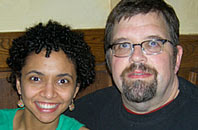
It is amazing that Juan Guzman is not dead. The story of Judge Juan Guzman and his investigation of Chile's General Augusto Pinochet is a portrait of courage exercised by an average man in the face of brutal repercussions and death.
Last night, the film that opened the Walker Art Film series, The Cinema of Urgency, was Elizabeth Farnsworth and Patricio Lanfranco's THE JUDGE AND THE GENERAL made for ITVS and scheduled to be shown on POV in mid-August. Farnsworth was born in south Minneapolis and her editor, Blair Gershkow who also attended last night's screening and stood up for Q&A afterward is a native of St. Louis Park, Minnesota - home of the Coen Bros., Thomas Friedman, and of course Al Franken.
The films Producer/Director Elizabeth Farnsworth was chief correspondent for The NewsHour with Jim Lehrer from 1995-2000. She now freelances for The NewsHour and makes award-winning documentaries, including Thanh's War.
The remarkable story of Judge Guzman is about a conservative judge assigned to investigate crimes and human rights violations by the military dictatorship of Pinochet and his government. Originally, Guzman was a supporter of the military coup that brought Pincochet to power. He even felt that some of the violence surrounding the coup and the suspension of democratic processes might have been necessary to restore order in the face of chaos.
However, during Guzman's investigation, which miraculously occurred while Pinochet still held the reigns of power, he discovers a grisly truth of the murder and torture of socialists and anti-military government political activists. And in the face of threats on his life and accusations of the betrayal of his class, Guzman did not back down.
What makes Farnsworth's documentary so compelling is Guzman is not the radical maverick judge one might expect and instead he is a literary man, quiet and reserved, with a French wife who could well have been given a diplomatic portfolio by the conservative government that Salvador Allende defeated to become the first democratically elected Socialist government in South America.
Farnsworth also focuses on the human rather than political dimensions of the struggle for truth. Inside the story of the "disappeared" and mothers of resistance in Chile is another tragedy of a grandmother forced to turn her own daughter and son-in-law into the CIA trained Chilean secret police DINA in exchange for saving the life of her granddaughter who she was babysitting at the time. The brutality of DINA's torture and the excruciating pain of a grandmothers decision is unfathomable to us, still its echo reverberates in Abu Ghraib and secret detention facilities run by the American government today.
During the course of his investigation, Guzman's soul opens to the bright light of human rights in the face of conformity and the dark abyss of apathy when governments call their opposition terrorists. This should be a lesson to all Americans in these corrupt and desperate times.
As Guzman memorably states abut Chile's history, “A wounded country needs to know the truth” and healing can only come when the deceptions, manipulations and lies are exposed.
25.7.08
The Cinema of Urgency
Posted by
Robb Mitchell
at
4:57 AM
0
comments
![]()
Labels: Augusto Pinochet, Elizabeth Farnsworth, Juan Guzman
Subscribe to:
Posts (Atom)


